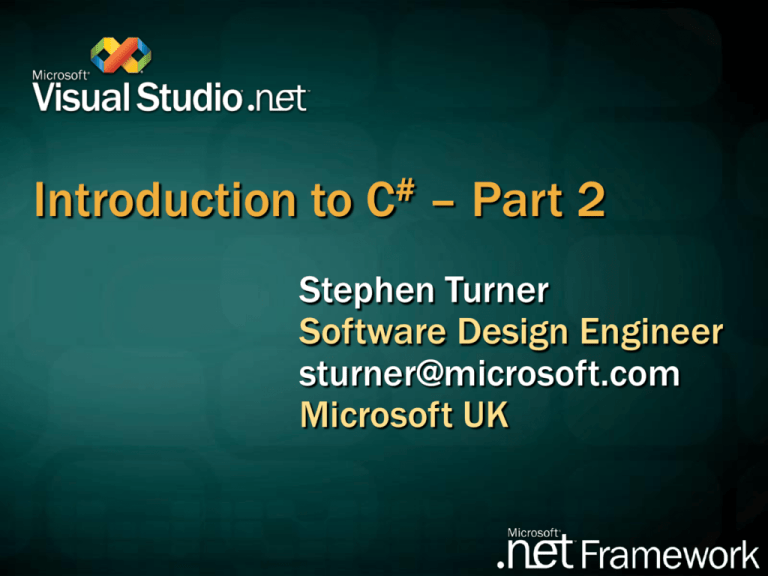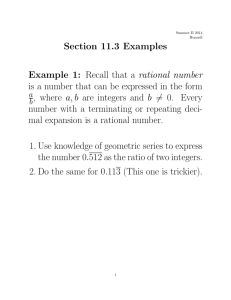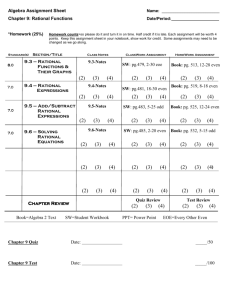
Introduction to C# – Part 2
Stephen Turner
Software Design Engineer
sturner@microsoft.com
Microsoft UK
Agenda
Design goals – Part 2
Fully extensible type system
Enable robust and durable applications
Leverage existing software
Standardization
Extending the Type System
Most users think of two types of objects
“Real” objects – Customer, Order, etc.
Primitive types – int, float, bool
Different expectations for each
Real objects are more expensive to create
Primitives always have a value
Primitives have operator support
Classes and Structs – best of both worlds!
Natural semantics
Operator overloading & User conversions
Interface support
Rational Numbers (½, ¾, 1½)
Rational r1 = new Rational(1,2);
Rational r2 = new Rational(2,1);
Rational r3 = r1.AddRational(r2);
double d = Rational.ConvertToDouble(r3);
Rational r1 = new Rational(1,2);
Rational r2 = 2;
Rational r3 = r1 + r2;
double d = (double) r3;
Rational Number – Class?
Heap allocated
Can be null
“=” assigns reference not value
Arrays allocate references not values
public class Rational
{
public Rational(int n, int d) { … }
}
…
Rational[] array = new Rational[100];
Structs Provide an Answer
Behavior differences versus Classes
Stored in-line, not heap allocated
Never null
Assignment copies data, not reference
Implementation differences
Always inherit from object
Always has a default constructor
Rational Number – Struct
public struct Rational
{
public Rational(int n, int d) { … }
public int Numerator
{ get{…} }
public int Denominator { get{…} }
public override string ToString() { … }
}
Rational r = new Rational(1,2);
string s = r.ToString();
Implicit Conversions
No loss of data
public struct Rational
{
…
public static implicit operator Rational(int i)
{
return new Rational(i,1);
}
}
Rational r = 2;
Explicit Conversions
Possible loss of precision and can throw
exceptions
public struct Rational
{
…
public static explicit operator double(Rational r)
{
return (double) r.Numerator / r.Denominator;
}
}
Rational r = new Rational(2,3);
double d = (double) r;
Operator Overloading
Static operators
Must take its type as a parameter
public struct Rational
{
…
public static Rational operator+ (
Rational lhs, Rational rhs)
{
return new Rational( … );
}
}
Rational r3 = r1 + r2;
r3 += 2;
Equality Operators
.NET Framework equality support
public override bool Equals(object o)
.Equals() should use operator==()
public static bool operator== (Rational lhs, Rational rhs)
public static bool operator!= (Rational lhs, Rational rhs)
if ( r1.Equals(r2) ) { … }
if ( !r1.Equals(r2)) { … }
if ( r1 == r2 ) { … }
if ( r1 != r2 ) { … }
Structs and Interfaces
Structs can implement interfaces to provide
additional functionality
Why? The same reasons classes can!
Examples
System.IComparable
Search and sort support in collections
System.IFormattable
Placeholder formatting
System.IFormattable
Types can support new formatting options
through IFormattable
Rational r1 = new Rational(2,4);
Console.WriteLine(“Rational {0}", r1);
Console.WriteLine(“Rational {0:reduced}", r1);
Implementing IFormattable
public struct Rational : IFormattable {
public string Format(
string formatStr, IServiceObjectProvider isop) {
s = this.ToString();
if ( formatStr == “reduced" ) { s = … }
return s;
}
}
Rational r1 = new Rational(2,4);
Console.WriteLine("No Format = {0}", r1);
Console.WriteLine("Reduced Format = {0:reduced}", r1);
No Format = 2/4
Reduced Format = 1/2
Agenda
Design goals – Part 2
Fully extensible type system
Enable robust and durable applications
Leverage existing software
Standardization
Robust and Durable Software
Garbage collection
No memory leaks and stray pointers
Exceptions
Error handling is not an afterthought
Type-safety
No uninitialized variables, unsafe casts
Versioning
Pervasive versioning considerations in all aspects
of language design
Language Safety vs. C++
If, while, do require bool condition
Goto can’t jump into blocks
Switch statement
No fall-through
Break, goto <case> or goto default
Checked and unchecked statements
Expression statements must do work
void Foo() {
i == 1; // error
}
Versioning
Overlooked in most languages
C++ and Java produce fragile base classes
Users unable to express versioning intent
C# allows intent to be expressed
Methods are not virtual by default
C# keywords “virtual”, “override” and “new”
provide context
But C# can't guarantee versioning
Can enable (e.g., explicit override)
Can encourage (e.g., smart defaults)
Method Versioning in Java
class Base // //
v1.0
v2.0
{
}public void
int Foo()
Foo()
{
Database.Log("Base.Foo");
}
}
class Derived extends Base // v1.0
{
public void Foo()
{
System.out.println("Derived.Foo");
}
}
Method Versioning in C#
class Base // //
v1.0
v2.0
{
}public virtual void
int Foo()
Foo()
{
Database.Log("Base.Foo"); return 0;
}
}
v1.0
class Derived : Base // v2.0
{
new virtual
void
void
Foo()
Foo()
public virtual
override
void
Foo()
{
Console.WriteLine("Derived.Foo");
super.Foo();
}
Console.WriteLine("Derived.Foo");
}}
}
Agenda
Design goals – Part 2
Fully extensible type system
Enable robust and durable applications
Leverage existing software
Standardization
Calling Into Existing DLLs
Runtime enables calling “C-Style” functions
Feature known as “Platform Invoke”
Attributes define how things work
Which library to use
How to marshal data
Structure layout in
memory
[DllImport]
[MarshalAs]
[StructLayout]
[FieldOffset]
DLL Import Examples
[DllImport("gdi32.dll")]
public static extern int CreatePen(
int style, int width, int color);
[DllImport("gdi32.dll", CharSet=CharSet.Auto)]
public static extern int GetObject(
int hObject, int nSize, [In, Out] ref LOGFONT lf);
Platform Invoke Limitations
Marshaler can’t handle every case
Ugly dealing with memory allocation
Complex structures can’t be marshalled
Complex P/Invoke is hard to debug
Play “convince the marshaller”…
Can’t use C++ objects
Can waste lots of time and effort
Did I say it was tough to debug?
Solution:
Use unsafe C# or Managed C++
COM Support
.NET Framework provides great COM support
TLBIMP imports existing COM classes
TLBEXP exports .NET types
Sometimes you need more control
Methods taking complicated structures
Large TLB – only using a few classes
System.Runtime.Interopservices
COM object identification
Parameter and return value marshalling
HRESULT behavior
COM Support
Sometimes you need more control
Methods with complicated structures
as arguments
Large TLB – only using a few classes
System.Runtime.InteropServices
COM object identification
Parameter and return value marshalling
HRESULT behavior
COM Support Example
[Guid(“56A868B1-0AD4-11CE-B03A-0020AF0BA770”)]
interface IMediaControl
{
void Run();
void Pause();
void Stop();
…
void RenderFile(string strFilename);
}
Unsafe Code – Pointers
Developers sometime need total control
Performance extremes
Dealing with existing binary structures
Advanced COM Support, DLL Import
C# “unsafe” = limited “inline C”
Pointer types, pointer arithmetic
unsafe casts
Declarative pinning (fixed statement)
Power comes at a price!
Unsafe means unverifiable code
Unsafe Code & P/Invoke
class FileStream: Stream {
int handle;
public unsafe int Read(
byte[] buffer, int index, int count) {
int n = 0;
fixed (byte* p = buffer) {
ReadFile(handle, p + index, count, &n, null);
}
return n;
}
[dllimport("kernel32", SetLastError=true)]
static extern unsafe bool ReadFile(
int hFile, void* lpBuffer, int nBytesToRead,
int* nBytesRead, Overlapped* lpOverlapped);
}
Agenda
Extending the type system
Creating a fully functional rational number type
Enable robust and durable applications
Language safety & code versioning
Leverage existing software investment
COM & DLL interop
Unsafe code and pointers
Standardization
C# and CLI Standardization
Work begun in September 2000
Intel, HP, IBM, Fujitsu, Plum Hall, and others
ECMA ratified in December 2001
ISO ratified in April 2003
Several CLI and C# implementations
.NET Framework and Visual Studio .NET
SSCLI – Shared source on XP, FreeBSD, OS X
Mono – Open source on Linux
Standardization of new features ongoing
Useful Resources
Web sites
http://www.gotdotnet.com/team/csharp
http://msdn.microsoft.com/vcsharp
http://msdn.microsoft.com/netframework
Newsgroups
http://msdn.microsoft.com/newsgroups
microsoft.public.dotnet.languages.csharp
Books
C# Language Specification” – MS Press
Inside C# – MS Press
C# Momentum
Over 50 trade books published
O’Reilly, Addison-Wesley, Prentice Hall, APress,
Osborne, Sams, Wrox, MS Press
Over 15 dedicated Web sites
http://www.csharp-station.com
http://www.csharphelp.com
http://www.csharptoday.com
http://www.csharpindex.com
Other site can be found at
http://msdn.microsoft.com/community
© 2003 Microsoft Ltd. All rights reserved.
This presentation is for informational purposes only. Microsoft makes no warranties, express or implied, in this summary.






